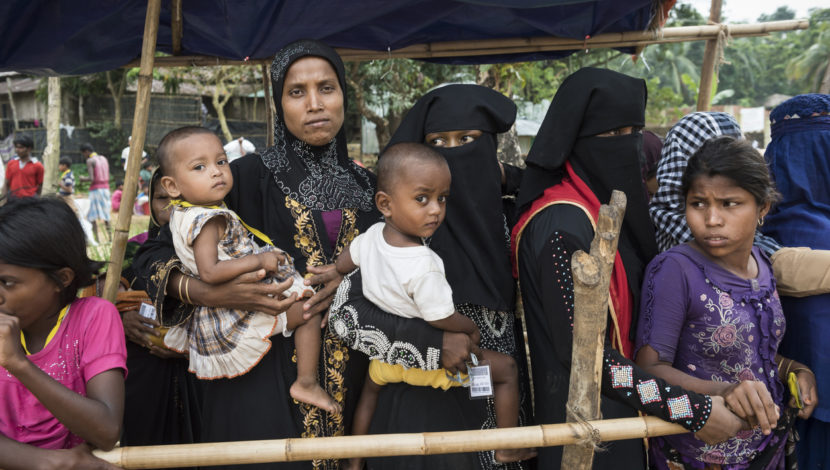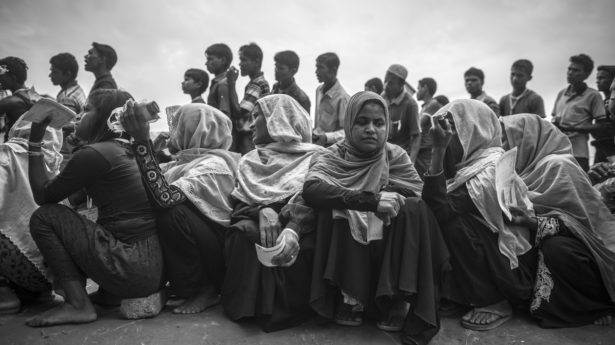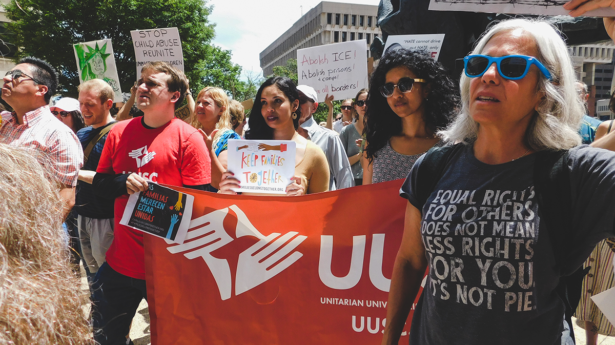The Unitarian Universalist Service Committee advances human rights through grassroots collaborations.
Remembering Lessons from the Holocaust to Overcome the Rohingya Genocide

By UUSC Staff on January 27, 2020
As we enter 2020 and acknowledge the historic 80-year anniversary of UUSC’s founding, we want to pay respects to International Holocaust Remembrance Day on January 27. This day is a day of observance to honor the lives of the six million Jewish people who were victims of a horrendous genocide during World War II. News of this genocide in the 1940s was the impetus for Waitstill and Martha Sharp to bravely devote their lives to saving European Jews and ultimately served as the genesis of UUSC.
Sadly, 80 years later, we’re still seeing horrific acts of genocide, and, staying true to the spirit of our founders, UUSC and its members have mobilized to bear witness, provide aid, and flank those suffering from injustice, this time in Burma (officially known as Myanmar).
In a historic and unanimous decision at The Hague on January 23, the International Court of Justice (ICJ) issued an injunction against the Burmese government and military to take concrete measures to prevent and effectively halt genocidal actions against the long-persecuted Muslim Rohingya minority. The imposition of provisional measures included the requirements to not only prevent the killing and physical and mental harm of the Rohingya people, but also to stop deliberate attempts to destroy the group through egregious policies and actions, such as the prevention of births.
The ICJ’s order further requires that Burma also report on its compliance to genocide prevention on a regular timeline throughout the lifespan of the legal case, which could take years to fully adjudicate. Notably, the ICJ’s decision also affirmed The Gambia’s argument of its right to uphold its own state obligations to prevent the crime of genocide and to act on its human rights principles by bringing the case forward to the world’s highest court, thus confirming for the first time the court’s jurisdiction to hear cases between two non-warring states under the 1948 Genocide Convention.
The larger point in question—whether the Burmese government has actually failed to uphold its obligations under the Genocide Convention, or whether genocide has effectively occurred—has yet to be determined, but the unprecedented and momentous acknowledgement of the “real and imminent risk of irreparable prejudice” has no doubt served as a clarion call for justice and accountability.
For many in the Rohingya community, this decision is the first concrete step on a long path to justice. More than one million Rohingya refugees still languish in Bangladesh in the world’s largest refugee camp, and nearly half a million others face ongoing violence and persecution as they remain in apartheid-like conditions in Burma. Grassroots communities’ engagement with and understanding of justice requires a holistic approach—including transitional and transformative justice programs—that international justice processes simply don’t address. With the ICJ’s legally binding ruling against Burma, timing is critical to support and mobilize the Rohingya community to understand these justice procedures, participate actively in them, and to ultimately guide the policy and development decisions that will determine the community’s long-term fate at every level.
In addition to supporting our Rohingya human rights partners with financial support, UUSC has also supported international convenings, capacity building workshops, and strategy sessions among key Rohingya community leaders, including those who are at the forefront of international justice and human rights campaigns. With a particular focus on bringing together women and youth, UUSC has dedicated its resources to ensure that Rohingya leaders have both the space and the support to fully take ownership and serve as the leading voices of the Rohingya issue across Asia, North America, and Europe.
UUSC believes that the ICJ’s decision is a clear signal that justice and accountability issues need to be absorbed into every political, social, and economic development engagement in Burma. The international community’s support for the country’s democratic political transition, its ethnic peace process, and its growing economy can no longer be separated from its now legally binding responsibilities to prevent the genocide of the Rohingya people. Some longtime Burma experts have held tightly to the idea that the domestic political will for justice and accountability simply doesn’t exist. However, a January 22 statement by more than 100 prominent civil society organizations representing numerous ethnic and social groups from across Burma unequivocally stated: “We believe that decisions made by the international court on matters related to acts committed using political power and military might are to bring forth the truth and serve to protect the people of Myanmar and aid us in achieving democracy, rights and justice.”
Overall, the ICJ’s provisional measures are not only about the prevention of genocide. The immeasurable trauma and violence experienced by the Rohingya people cannot be undone, but the space created by the ICJ’s decision can be seized to promote healing, growth, and solidarity among the Rohingya and all of Burma’s people, especially at the local grassroots level. What is indeed possible is the international community’s recalibration of its approach to Burma to ensure that its development support is truly responding to and cultivating grassroots communities and leaders; building collaborations among individual leaders, civil society, and government actors where they haven’t yet existed; and ensuring that human rights values, justice, and accountability form the very foundation of the country’s development.
As we reflect on the memories of the historic work UUSC has done across the world in the last 80 years, we turn to the future with a sense of hope and a continued commitment to justice and affirming the worth and dignity of every person.
***
About UUSC: Guided by the belief that all people have inherent worth and dignity, UUSC advances human rights globally by partnering with affected communities who are confronting injustice, mobilizing to challenge oppressive systems, and inspiring and sustaining spiritually grounded activism for justice. We invite you to join us in this journey toward realizing a better future!
Photo Credit: iStock – Joel Carillet

